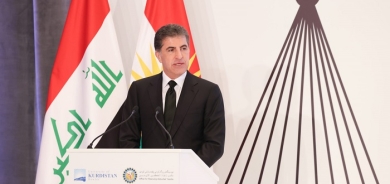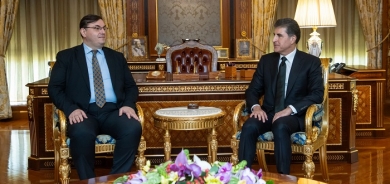Western states train Kurdish force in Syria, force's leader says

Western states have provided counter-terrorism training in Syria to Kurdish security forces that are battling Islamic State, the head of the force said, in a significant expansion of support to the Kurdish administration in northern Syria.
The internal security force, known as the Asayish, is part of the Kurdish administration that has emerged in areas of northern Syria where the Damascus-based state has lost control since the eruption of the Syrian war in 2011.
The Kurds have proven the only effective partner on the ground in Syria for a U.S.-led air campaign against Islamic State, having seized wide areas of territory from the jihadists this year near the border with Turkey.
Ciwan Ibrahim, head of the Asayish, told Reuters that more than 450 members of the force had received training in northern Syria - an area known as Rojava in Kurdish - in techniques such as how to deal with car bombs and booby-trapped buildings.
"Some Western states provided support and teams to provide training in Rojava," he said in an interview conducted via Skype. He said the training took place in the last two months but declined to identify the countries or give further details.
"We appeal to all powers and neighboring states: Rojava needs support in training, equipment and technology," he said.
The training signals a new level of backing from Western governments for the Syrian Kurdish administration, the growing power of which has alarmed neighboring Turkey which has its own Kurdish insurgency.
The Asayish, numbering in the thousands and formed in 2012, are part of a Kurdish security apparatus that includes the YPG militia that is leading the fight against Islamic State in the north.
With NATO member Turkey anxious about the expansion of Kurdish influence in that area, support to the Kurdish administration is a sensitive topic for the West. But at the same time the Syrian Kurds say they are in dire need of support to secure newly captured areas from Islamic State infiltration.
The Syrian Kurds now control a 400 km-long (250 mile) uninterrupted stretch of the Syrian-Turkish border.
Ibrahim said the Asayish aimed to "to fully clean the area behind the YPG which is advancing". The training provided so far had produced "excellent results", he said.
PRISONER SWAP
The Asayish are frequently targeted by Islamic State, most recently on Aug. 19, when a suicide bomber set off a truck bomb outside an Asayish headquarters in the city of Qamishli, killing 12 people including two members of the force.
Ibrahim said the Asayish is working to reorganize itself to deal with the threat of such attacks and aimed to develop training facilities drawing on the experience of European states.
The Kurdish administration's recent territorial gains include the city of Hasaka, which was divided into zones controlled by the Syrian government and the Kurds until an Islamic State attack in June.
Overstretched government forces collapsed in the face of that attack, leaving the city's defense to the YPG, which now controls nearly all of Hasaka.
Ibrahim said the Asayish had detained around 30 members of pro-government militia who had surrendered to Kurdish forces during the fighting, including some foreigners. The aim was to negotiate a prisoner swap with the Damascus government.
"There are Kurds and supporters of ours in the regime jails. We are trying to put pressure on them via those prisoners, to benefit from them, to secure the release of the Kurds held by the regime," Ibrahim said.
Ibrahim, 34, was appointed head of the Asayish by the Kurdish administration's interior ministry.
A mathematical physicist by training, he was a Kurdish rights activist who had been on the run from the Syrian government prior to the eruption of the Syrian war in 2011.
Amnesty International this month faulted the Kurdish administration for arbitrary detentions and unfair trials, saying it was using the fight against Islamic State as a pretext to unlawfully detain and unfairly try peaceful critics.
Ibrahim said the Asayish had made mistakes in the past which he attributed to a lack of experience, and efforts were underway to improve its human rights record. He said there were no political prisoners in Asayish jails.
"There are no arbitrary detentions. We suffer from the problem of terrorism in our area. All the detentions take place based on suspicion or accusation of terrorism," he said.
The Asayish had been undergoing human rights training from organizations including the Geneva Call, a group which promotes good treatment of civilians in war zones, for three months.
"These efforts are still underway," Ibrahim said.
(Writing by Tom Perry; Editing by Peter Graff)
REUTERS















